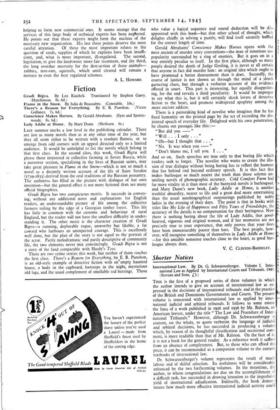Fiction
Gvadi Bigva. By Leo Kiacheli. Translanted by Stephen Garry. (Hutchinson. 8s. 6d.)
Lady Addle at Home, By Mary Dunn (Methuen. 6s.)
LATE summer marks a low level in the publishing calendar. There are just as many novels then as at any other time of the year, but they all seem either to be written with a resolute flatness or to emerge from odd corners with an appeal directed only to a limited .audience. It would be unhelpful to list the novels which belong to that first class. In the second class, this week, Gvadi Bigva will please those interested in collective farming in Soviet Russia, while a narrower section, specialising in the lives of Russian saints, may take great pleasure in Flame in the Snow—which is not so much a novel as a decently written account of the life of. Saint Serafim (1759-1833) derived from the oral traditions of the Russian peasantry. The authoress has filled in the picture with dialogue of her own invention—but the general effect is not more fictional than are many official biographies.
Gvadi Bigva has two conspicuous merits. It succeeds in convey- ing, without any additional notes and explanations for English readers, an understandable picture of life among the collective farmers toiling by the edge of a Georgian timber forest. This life has little in common with the customs and behaviour of rural England, but the reader will not have the smallest difficulty in under- standing it. The other merit is the character creation of Gvadi Bigva—a cunning, deplorable rogue, unworthy but likable, a fat coward who harbours an unexpected courage. This is excellently well done, but the plan of the story is not equal to the portrait of the actor. Partly melodramatic and partly descriptive of community life, the two elements never mix convincingly. Gvadi Bigva is not a story of the land comparable with Hardy's Tess.
There are two crime stories this week, but neither of them reaches the first class. There's a Reason for Everything, by E. R. Punshon, is an old-style example of detective fiction with ariempty haunted house, a body in the cupboard, footsteps in the night, mysterious old lags, and the usual complement of smellable red herrings. Those
who value a logical sequence and sound deduction will be dis- appointed with this book—but that other school of thought, which delights chiefly in solving a puzzle, will find itself securely baffled for the correct length of time.
Gerald Abrahams' Conscience Makes Heroes opens with the most ancient of murder story conventions—the man of notorious un- popularity surrounded by a ring of enemies. But it goes on in a way entirely peculiar to itself. In the first place, although so many people desired the death of Judge Gosling, it is never at all certain that anyone in fact did murder him: an original idea which ought to have promoted a better denouement than it does. Secondljr, the course of justice is not shown us through the mind of a sleuth garnering clues, but through a verbatim account of the evidence offered in court. This part is interesting, but equally disappoint- ing, for the end reveals a third peculiarity. It would be improper to say what this is, but it will certainly shock lovers of detective fiction to the heart, and promote widespread apoplexy among the more ancient addicts.
There is a painstaking kind of novelist who imagines that he has fixed humanity on the printed page by the act of recording the dis- jointed speech of everyday life. Delighted with his own penetration, he churns out passages like this "But did you —" "Well . . . I only . . "
"Oh—but I thought that. . ."
"No. It was when you —"
"Don't blame me, I tell you. I . . And so on. Such speeches are true only to that boring life which readers seek to forget. The novelist who wants to create the illu- sion of true dialogue without being boring has to reflect the humour that lies behind and beyond ordinary speech. It is this fact that makes burlesque so much nearer the truth than those solemn un- smiling novels of phonographic accuracy. Cold Comfort Farm had far more vitality in it than most of the barnyard novels it burlesqued. and Mary Dunn's new book, Lady Addle at Home, is another truthful absurdity, nearer to life and a great deal more entertaining than the usual autobiographical outpourings published by noble ladies in the evening of their days. The point is that in books with titles like My Life of Happiness and Fifty Years of Friendships, the accuracy of the details is no compensation for their boringness. Now 9. there is nothing boring about the life of Lady Addle, that good- hearted, vigorous and original woman, and if her memories are not precisely true to your experience, that only proves that your -lives have been immeasurably poorer than hers. The best people, how- ever, will recognise something of themselves in Lady Addle at Home —for this amiable nonsense touches close to the heart, as good bur- lesque always does.
29
V. C. CLINTON-BADDELEY.


























 Previous page
Previous page